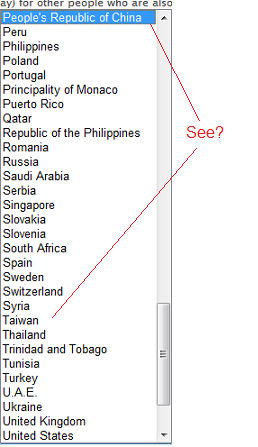My colleague Wisdom posts a comment on this blog, and also asks
Side talk, why i can't find China in the country List, when i am adding a comment?
Hmmm.
In looking into this, I checked into the relevant BlogEngine.NET code, which looks something like the following (see CommentView.ascx.cs):
foreach (CultureInfo ci in CultureInfo.GetCultures(CultureTypes.SpecificCultures))
{
RegionInfo ri = new RegionInfo(ci.Name);
if (!dic.ContainsKey(ri.EnglishName))
{
dic.Add(ri.EnglishName, ri.TwoLetterISORegionName.ToLowerInvariant());
}
if (!col.Contains(ri.EnglishName))
{
col.Add(ri.EnglishName);
}
}
… that looked perfectly fine. It does seem from other .NET framework communications that it is possible for this code not to be all-inclusive. And, in fact, the BlogEngine.NET code underscores this potential issue, with the following code in the same method:
// Add custom cultures
if (!dic.ContainsValue("bd"))
{
dic.Add("Bangladesh", "bd");
col.Add("Bangladesh" );
}
It also seems, on further investigation, that other blogs besides mine that are based on Blog.Net have seen this issue specifically with Chinese viewers.
What's the real problem?
Cultural-appropriateness is in the eye of the beholder
In his response to the question specifically about BlogEngine, Mads Kristensen points out that China is on the list. It's just listed according to its SpecificCulture-EnglishName value, which is People's Republic of China, not China.

You can see this illustrated in the MSDN post on the CultureInfo class, in fact, where different "manifestations" of Chinese culture info are shown, in response to the following sample code:
foreach ( CultureInfo ci in CultureInfo.GetCultures( CultureTypes.SpecificCultures ) )
{
if ( ci.TwoLetterISOLanguageName == "zh" ) {
Console.Write( "0x{0} {1} {2,-37}", ci.LCID.ToString("X4"),
ci.Name, ci.EnglishName );
Console.WriteLine( "0x{0} {1} {2}", ci.Parent.LCID.ToString("X4"),
ci.Parent.Name, ci.Parent.EnglishName );
}
}
… like this:
|
SPECIFIC CULTURE |
PARENT CULTURE |
|---|---|
| 0x0404 zh-TW Chinese (Taiwan) | 0x7C04 zh-CHT Chinese (Traditional) |
| 0x0804 zh-CN Chinese (People's Republic of China) | 0x0004 zh-CHS Chinese (Simplified) |
| 0x0C04 zh-HK Chinese (Hong Kong S.A.R.) | 0x7C04 zh-CHT Chinese (Traditional) |
| 0x1004 zh-SG Chinese (Singapore) | 0x0004 zh-CHS Chinese (Simplified) |
| 0x1404 zh-MO Chinese (Macao S.A.R.) | 0x7C04 zh-CHT Chinese (Traditional) |
So, okay. That behavior and classification system seems perfectly defensible and understandable…
…But it's not good enough.
Think about it this way: Wisdom, the consumer of this framework result, is already working in a language that is not his own, just to read the blog and navigate the list. I am truly grateful he makes the effort.
Why should he have to realize that the English-speaking world refers to his country as "People's Republic of China", when his motherland-centered heart envisions it as "China", even in English?
He knows he's supposed be navigating this list according to a sort-order based on an alphabetization that is also not his — in which "P" is nowhere near "C". Why should he look near "P"?
I want to point out that Wisdom didn't even ask "why isn't the value in the list". He asked: "why can't I find the value in the list." It's there, but he can't find it. And it's not his fault, even though he implicitly accepted that the problem was his.
I value Wisdom's comments, and those of the other members of my team. So, while I "get" the value of the .NET framework generalized approach here, I'm going to include the following, along with the Bangladesh-adding coding example quoted above, in the original code:
//LSN
// add to standard-generated
// <option value="cn">People's Republic of China</option>
dic.Add("China", "cn");
col.Add("China");
Sure, it's a hack. So what?
No perfect balance
When you work in a globally-dispersed team, as I do, you often have to balance two goals:
- Everybody needs to share some common vocabulary and frame of reference. Consensus isn't real if every member of the group has a different idea of what was discussed and agreed on.
From a technical point of view, frameworks like .NET provide a common vocabulary in the guise of a set of shared classes and libraries, with known capabilities, features, and functions. The fact that the names of the classes are English-based, in many if not all cases, doesn't prevent non-English-speakers from understanding the usage of the classes, although it may make it more difficult for non-English-speakers from guessing at the usage of the classes.
As the team develops its own libraries, this common vocabulary widens. The team's "shared muscles" develop strength and agility.
From a non-technical point of view, the team starts with a few shared cultural assumptions, such as: "We are all software developers" and "We all work for the same company", and it slowly develops its own culture, based on shared jokes, memories, experiences, conversations, and hours.
- Everybody needs to respect some boundaries based on cultural disparity. Because my team has both US and China members, it's not okay for any of us to assume availability of team resources based on our own cultural calendar and holiday schedule. Both US and Chinese team members sometimes generalize about "Americans", but if we had Canadian or Mexican team members, they might take exception.
From a technical point of view, frameworks like .NET provide a way to localize user interfaces and feedback mechanisms, calendars, and so on, to express an application's respect for each user's cultural frame of reference.
From a non-technical point of view, we make all kinds of personal accommodations, from crazy working hours to fine-tuned expectations of communications style.
As goals, the drive-to-consensus and respect-for-differences often undercut each other.
We all do the best we can. So does the .NET Framework, I guess.
There's no moral here.